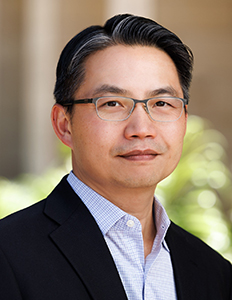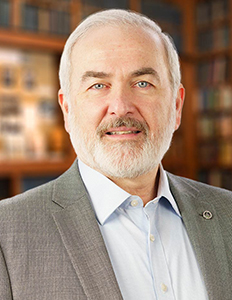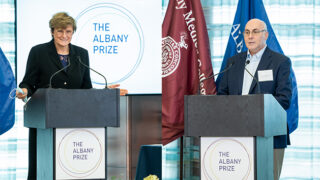2024 Recipients
The three esteemed recipients of the 2024 Albany Medical Center Prize in Medicine and Biomedical Research are scientists who have advanced the study and understanding of RNA-mediated gene regulatory programs in genetic and acquired diseases, including spinal muscular atrophy, cancers, and autoimmune diseases.
The Albany Prize is made possible by the Marty and Dorothy Silverman Foundation

Howard Y. Chang, MD, PhD
Howard Y. Chang, MD, PhD
Virginia and D.K. Ludwig Professor of Cancer Research
Professor of Dermatology, Genetics, and Pathology
Director, RNA Medicine Program
Stanford University School of Medicine
Investigator, Howard Hughes Medical Institute
Howard Y. Chang MD, PhD, is the Virginia and D.K. Ludwig Professor of Cancer Research and director of the Center for Personal Dynamic Regulomes at Stanford University. He is a Howard Hughes Medical Institute Investigator; he is also professor of Dermatology and of Genetics at Stanford University School of Medicine. Dr. Chang earned a PhD in Biology from MIT, an MD from Harvard Medical School, and completed Dermatology residency and postdoctoral training at Stanford University.
His research addresses how large sets of genes are turned on or off together, which is important in normal development, cancer, and aging. Dr. Chang discovered a new class of genes, termed long non-coding RNAs, can control gene activity throughout the genome, illuminating a new layer of biological regulation. He invented ATAC-seq and other new methods for defining DNA regulatory elements genome-wide and in single cells. The long-term goal of his research is to decipher the regulatory information in the genome to benefit human health.
Dr. Chang is a member of the National Academy of Sciences, National Academy of Medicine, and American Academy for the Arts and Sciences. Dr. Chang’s honors include the NAS Award for Molecular Biology, Outstanding Investigator Award of the National Cancer Institute, Paul Marks Prize for Cancer Research, Judson Daland Prize of the American Philosophical Society, and the Vilcek Prize for Creative Promise. His work was honored by the journal Cell as a Landmark paper over the last 40 years and by Science as “Insight of the decade."

Adrian R. Krainer, PhD
Adrian K. Krainer, PhD
St. Giles Foundation Professor
Cancer Center Program Co-Leader
Cold Spring Harbor Laboratory
Adrian R. Krainer, PhD, is the St. Giles Foundation Professor at Cold Spring Harbor Laboratory. He received a BA in Biochemistry from Columbia University in 1981, followed by a PhD in Biochemistry from Harvard University in 1986, working on the mechanism of human pre-mRNA splicing. He continued his research on RNA splicing as a Cold Spring Harbor Fellow, and then joined the faculty at CSHL in 1989. In addition to studying RNA splicing mechanisms, regulation, and dysfunction in disease, his laboratory is engaged in the development of mechanism-based targeted therapies to correct or modulate alternative splicing in various genetic diseases and cancers. This work has resulted to date in 238 publications and 17 issued patents.
In collaboration with Ionis Pharmaceuticals and Biogen, Dr. Krainer’s laboratory developed the antisense oligonucleotide nusinersen (Spinraza), which corrects a splicing defect in the SMN2 pre-mRNA. Nusinersen was granted FDA approval in 2016, as the first treatment for spinal muscular atrophy, a motor-neuron disease that was the leading genetic cause of infant mortality. This disease-modifying therapy has so far helped over 14,000 patients worldwide. Dr. Krainer is also a co-founder, director, and chair of the SAB of Stoke Therapeutics, a biotechnology company that is developing antisense drugs for Dravet syndrome, autosomal dominant optic atrophy, and other rare diseases.
Dr. Krainer was elected to the National Academy of Sciences, the National Academy of Medicine, the National Academy of Inventors, and the American Academy of Arts & Sciences, in addition to several international scientific academies. His awards and accolades include the 2019 Life Sciences Breakthrough Prize (shared with Dr. Frank Bennett), the 2019 Lifetime Achievement Award of the RNA Society, the 2019 International Prize for Translational Neuroscience (shared with Dr. Richard Finkel), the 2019 Peter Speiser Award in Pharmaceutical Sciences, the 2020 Takeda Pharmaceuticals Innovators in Science Senior Scientist Award in Rare Diseases, the 2020 Ross Prize in Molecular Medicine, the 2021 Wolf Prize in Medicine (shared with Drs. Joan Steitz and Lynne Maquat), the 2021 Gabbay Award in Biotechnology & Medicine (shared with Dr. Frank Bennett), the 2022 August M. Watanabe Prize in Translational Research, and an honorary doctorate from Tel Aviv University in 2019.
Dr. Krainer has mentored 23 doctoral students and 38 postdoctoral fellows to date. He served as President of the RNA Society in 2014, and currently serves on the advisory boards of several scientific centers and networks, nonprofit foundations, and biotechnology companies in the U.S., Europe, and Latin America.

Lynne E. Maquat, PhD
Lynne E. Maquat, PhD
J. Lowell Orbison Endowed Chair and Professor
Department of Biochemistry and Biophysics, Oncology, and Pediatrics
Director, Center for RNA Biology: From Genome to Therapeutics
Chair, Graduate Women in Science
University of Rochester
Lynne E. Maquat, PhD, is the J. Lowell Orbison Endowed Chair and Professor of Biochemistry & Biophysics who holds concomitant appointments in Pediatrics and in Oncology, founding director of the Center for RNA Biology, and founding chair of Graduate Women in Science at the University of Rochester in Rochester, N.Y.
After obtaining her PhD in biochemistry from the University of Wisconsin-Madison and undertaking post-doctoral work at the McArdle Laboratory for Cancer Research, she joined Roswell Park Cancer Institute before moving to the University of Rochester Medical Center. Dr. Maquat’s research focuses on the molecular basis of human diseases, with particular interest in mechanisms of mRNA decay. Maquat discovered nonsense-mediated mRNA decay (NMD) in human diseases in 1981 and, subsequently, the exon-junction complex (EJC) and how the EJC marks mRNAs for a quality-control “pioneer” round of protein synthesis. She also discovered Staufen-mediated mRNA decay, which mechanistically competes with NMD and, by so doing, new roles for short interspersed elements and long non-coding RNAs. Additionally, she has defined a new mechanism by which microRNAs are degraded, thereby regulating mRNAs so as to promote the cell cycle. One of her current interests focuses on the development of therapeutics for diseases that she has shown manifest hyperactivated NMD, including the most common single gene cause of intellectual disability and autism, Fragile X syndrome.
Maquat is an elected fellow of the American Association for the Advancement of Science (2006); an elected member of the American Academy of Arts & Sciences (2006), the National Academy of Sciences (2011), and the National Academy of Medicine (2017); and a Batsheva de Rothschild Fellow of the Israel Academy of Sciences & Humanities (2012-3). She was recently elected to the Council of Scientific Advisors for the International Centre for Genetic Engineering and Biotechnology (ICGEB), an initiate of the United Nations Industrial Development Organization (2022). She received the William C. Rose Award from the American Society for Biochemistry & Molecular Biology (2014), a Canada Gairdner International Award (2015), the international RNA Society Lifetime Achievement Award in Service (2010) and in Science (2017), the FASEB Excellence in Science Award (2018), the Vanderbilt Prize in Biomedical Science (2017), the Wiley Prize in Biomedical Sciences from Rockefeller University (2018), the International Union of Biochemistry and Molecular Biology Medal (2019), the Wolf Prize in Medicine from Israel (2021), the Warren Alpert Foundation Prize from Harvard Medical School (2021), and the Gruber Genetics Prize from the Gruber Foundation and Yale University (2023).
Maquat is well-known for her national and international efforts to promote women in science.



